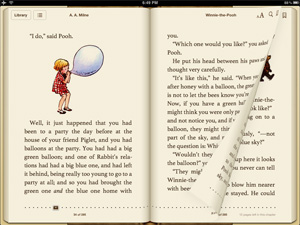Oops, I Swiped My Book: Nostalgia and Finitude in Digital Media
 I did something silly the other day – I swiped my book. It was an uncanny moment of rupture in a privileged mediascape of seamless windows, paired devices, and intuitive user interfaces. The book did not respond with visual and aural feedback, it did not silently aggregate my clickstream, nor did it push notifications about my reading milestones. It just lay there – stubbornly refusing to remediate itself to my tablet-kindled expectations. In an effort to rationalize my embarrassment over this medium mix-up, I turned to the Web for answers. What is the appeal of the page-flip interface on tablet readers? Why do we like digital user interfaces that mimic familiar objects in the real world?
I did something silly the other day – I swiped my book. It was an uncanny moment of rupture in a privileged mediascape of seamless windows, paired devices, and intuitive user interfaces. The book did not respond with visual and aural feedback, it did not silently aggregate my clickstream, nor did it push notifications about my reading milestones. It just lay there – stubbornly refusing to remediate itself to my tablet-kindled expectations. In an effort to rationalize my embarrassment over this medium mix-up, I turned to the Web for answers. What is the appeal of the page-flip interface on tablet readers? Why do we like digital user interfaces that mimic familiar objects in the real world?
A recent Wired post suggests that the page-flip user interface – which replaces scrolling navigation with rigid paginated screens – is a popular feature that set tablet reading apps like iBooks, Flipboard, and Instapaper apart from their competitors. iBooks in particular, features a dramatic page-flip animation with a curled edge and translucent text rendered on the underside of pages as they are turned – a feature recently adapted by Instapaper. This is all pretty fancy stuff that designers admit is arbitrary to un-paginated web content. According to Wired, by mimicking the familiar book, the page-flip beats its scrolling counterparts by being more intuitive and “classy.”
Bolter and Grusin would agree that this is part of the formal logic of remediation – newer media are fashioned in the image and expectations of older media (and vice versa). They would also agree that the page-flip interface’s intuitiveness and classiness fulfills the double logic of remediation – that of immediacy and hypermediacy. So, looking like a book erases the need for scroll bars or buttons, creating a more immediate user experience; yet the book interface adds an audiovisual layer that makes us hyper aware of our mediated experience.
And let’s not forget a more fundamental and related reason why we like the page-flip interface – it’s cooler. Is Apple’s iBooks cooler than Amazon’s Kindle in the same way that Instagram is cooler than your mom’s digital photos? Did Apple include a sepia-toned filter to its iPad reader for the same reason Instagram built its brand around their polaroid-esque “1977” filter? Before you stop scrolling/flipping because you think you’ve heard this story before – I’m not blaming it all on nostalgia, as postmodern theorists have done since Frederic Jameson in 1984. Well, actually I am, but with the important caveat that not all nostalgias are created equal.
Drawing on Susan Sontag, this New Yorker post suggests that Instagram taps a mode of nostalgia specific to photography. Photographs freeze moments in time and thus remind us of the inexorable passing of time and transience of human experience. By instantly aging images through its filters, Instagram simulates nostalgic desire and esteem for moments that are arguably still in progress. Instagram’s recent $1 billion sale to Facebook is another testament to Jameson’s observation that this nostalgia of the present is endemic to contemporary consumer capitalism.
Perhaps the page-flip user interface taps a mode of nostalgia specific to our relationship to knowledge – nostalgia for a way of knowing that is bounded and finite. Let’s consider two popular tablet news aggregators, Flipboard and Pulse. Flipboard curates news in a magazine format that paginates articles and collections of articles. When I’m on Flipboard, I always know which page I’m on relative to the total pages of each article and each collection. Pulse presents my news through vertical scrolling through collections, horizontal scrolling between articles, and vertical scrolling within articles. When I’m on Pulse, I feel like I’m on an information treadmill, always moving from one story to the next. However artificial or arbitrary, Flipboard gives me a sense of orientation relative my reading accomplishments and goals. Pulse on the other hand, replaces accomplishment with an insatiable appetite for evermore stories, anecdotes, images, statistics. Jodi Dean relates this compulsive pattern of media consumption to psychoanalytic theories in her conception of “circuits of drive.”
 The book encapsulates and now simulates a mode of knowing this is a far cry from the distracted and unbounded media consumption habits of the networked present. Before Jameson – the story goes – readers of books lived in an era where stories held a sense of discreteness, finitude, and authority. Perhaps it’s no coincidence that in a networked age riddled with mediated circuits of drive that lead everywhere and nowhere, critics and moviegoers are ineluctably drawn to a film like Hugo. In a pivotal scene that crystallizes the film’s central metaphor, Hugo explains his fascination with machines – the thing that automatons, clocks, and 20th century cities have in common is that they are built to fulfill a purpose. By fixing his beloved automaton, Hugo unlocks the secret left by his father, and fulfills his destiny of social integration.
The book encapsulates and now simulates a mode of knowing this is a far cry from the distracted and unbounded media consumption habits of the networked present. Before Jameson – the story goes – readers of books lived in an era where stories held a sense of discreteness, finitude, and authority. Perhaps it’s no coincidence that in a networked age riddled with mediated circuits of drive that lead everywhere and nowhere, critics and moviegoers are ineluctably drawn to a film like Hugo. In a pivotal scene that crystallizes the film’s central metaphor, Hugo explains his fascination with machines – the thing that automatons, clocks, and 20th century cities have in common is that they are built to fulfill a purpose. By fixing his beloved automaton, Hugo unlocks the secret left by his father, and fulfills his destiny of social integration.
 This is arguably a fantasy of compensation inspired by the same cybernetic zeitgeist that has ushered in a world/view of networked complexity and posthuman agnosticism. Instead of financial networks of systemic risk and digital networks of emergent outcomes, perhaps we are all nostalgic for Newton’s good old world machine – a bounded entity designed for predetermined outcomes. Like Hugo and his automaton, perhaps we too long to find our missing pieces, to fix our broken parts, and to fulfill the purpose we were designed for. Purpose and especially destiny can only exist in bounded systems with finite outcomes, kind of like a machine, a clock, or a book. Can a book really tell us about our changing attitudes towards knowledge? Can a page-flip user interface really shed light on ways of being in the world? The answers to these questions are not governed by destiny, but by your emergent responses.
This is arguably a fantasy of compensation inspired by the same cybernetic zeitgeist that has ushered in a world/view of networked complexity and posthuman agnosticism. Instead of financial networks of systemic risk and digital networks of emergent outcomes, perhaps we are all nostalgic for Newton’s good old world machine – a bounded entity designed for predetermined outcomes. Like Hugo and his automaton, perhaps we too long to find our missing pieces, to fix our broken parts, and to fulfill the purpose we were designed for. Purpose and especially destiny can only exist in bounded systems with finite outcomes, kind of like a machine, a clock, or a book. Can a book really tell us about our changing attitudes towards knowledge? Can a page-flip user interface really shed light on ways of being in the world? The answers to these questions are not governed by destiny, but by your emergent responses.


